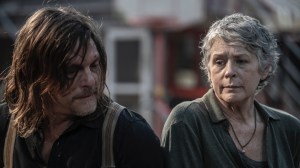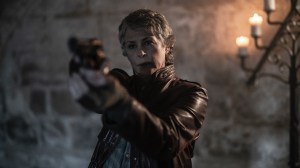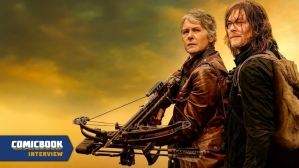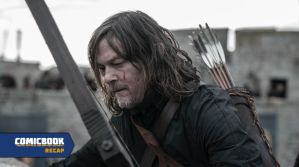Last week, The Walking Dead executive producer Gale Anne Hurd said that the show had altered its approach to violence following backlash of the Season 7 premiere’s slaughtering of Glenn and Abraham.
“We were able to look at the feedback on the level of violence,” Hurd said during a panel session at the NATPE conference (via Variety). “We did tone it down for episodes we were still filming for later on in the season.”
Videos by ComicBook.com
The comments were met with even more backlash from the fans who have stuck with the AMC series through a highly-criticized eight episode run in Season 7’s first half. With over 10 million viewers still onboard on a weekly basis, the numbers are worrysome considering the near 7 million viewer drop over a two month span, which may have been what prompted Hurd’s comments.
Now, the showrunner Scott Gimple and executive producer/VFX supervisor Greg Nicotero are contradicting Hurd’s comments and standing by The Walking Dead‘s approach to violence.
“The violence in the premiere was pronounced for a reason,” Gimple told EW. “The awfulness of what happened to the characters was very specific to that episode and the beginning of this whole new story. I don’t think like that’s the base level of violence that necessarily should be on the show. It should be specific to a story and a purpose, and there was a purpose of traumatizing these characters to a point where maybe they would have been docile for the rest of their lives, which was Negan‘s point. But I will say again, the violence in the premiere was for a specific narrative purpose and I would never say that that’s the baseline amount of violence that we would show on the show. If we’re ever going to see something that pronounced, there needs to be a specific narrative purpose for it.”
Nicotero, who takes pride in his ability to creatively portray the harsh world that is the apocalypse, simply says, “No,” when asked if the violence has been toned down to appease fans.
“As brutal as that episode 1 was, it’s still part of our storytelling bible, which is what the world is about,” Nicotero said. “I don’t think we would ever edit ourselves, and I think — even after looking at that episode 1 again — as tough as it was for people to watch, I don’t think we would have done it any differently. I don’t think we’ll ever pull ourselves back. There is definitely a difference between violence against walkers and human on human violence, but truthfully, we’re serving our story.”
As for editing scenes, Joshua Hoover who played Fat Joey on The Walking Dead was brutally beaten to death by Norman Reedus’ Daryl Dixon. However, the scene didn’t feature any clips of Hoover’s head actually being destroyed but instead, Daryl swinging and Jesus’ reaction.
“I took a hit on the head from Mr. Norman Reedus, and it was a good hit,” Hoover told Comicbook.com. “I got hit right square in the head. There was the special effects that they do with the blood packet. They had a blood packet on the pipe and it just went everywhere. Everybody said it looked so awesome, but also pretty graphic. So I’m assuming that’s why they didn’t show that angle, they probably had a little too much already with Spencer’s guts.”
None of those clips made the cut. Furthermore, the iconic iron scene from The Walking Dead comics was gruesome but didn’t stand out as much as some may have expected it to. Rather than watching Mark’s skin melt onto Negan’s hot iron, the scene chose to focus more on the terror on the faces of Saviors and Daryl.
Was violence cut in either of those instances?
“Specific to that scene, I guess specific to everything, no,” Gimple said. “Greg Nicotero is the greatest makeup special effects guy in the world, but… what you don’t see sometimes can be so much more horrible than what you see, what you imagine. And with the iron, that’s a really good example. That’s something that I think the audience should do a little bit more of the work on. Also because as far as that kind of moment, the reality of what that would look like is strange looking. We’ve been in fist fights when we were kids on the playground and there’s amalgams to that violence, but that kind of strange burn, the audience doing that in their head, even hearing it, it’s just a different moment.”
With Hurd making remarks indicating a new approach to violence to appease those who can’t handle it and Gimple standing by the show’s approach, it seems the conversations have definitely been had by the team behind The Walking Dead.
Whether or not The Walking Dead is going to keep up the violence in its next eight episodes and going forward will be seen when the show returns on February 12. For complete coverage and insider info, follow @BrandonDavisBD on Twitter.





